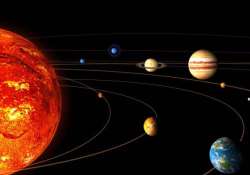Neptune Completes First Revolution Of Sun
New Delhi, Jul 10 : Neptune—the blue coloured eighth planet of the solar system, will this year complete its first revolution of the sun since its discovery in 1846. The heavenly body will celebrate its birthday

New Delhi, Jul 10 : Neptune—the blue coloured eighth planet of the solar system, will this year complete its first revolution of the sun since its discovery in 1846.
The heavenly body will celebrate its birthday on July 13 at 03:06 IST when it reaches approximately the same heliocentric longitude 329°.1020 as at the time of its discovery, R C Kapoor of Indian Institute of Astro Physics said.
To watch the planet, see Capricornus and Aquarius constellations between the stars Delta Capricorni and Lambda Aquari to be precise, he said, adding, one needs a moderate sized telescope to view it.
Neptune will be in opposition on August 22, 2011, which means it will rise around when the sun sets in the west and shall be up all night, he said.
Neptune is also the first planet found by mathematical prediction rather than by observation, C B Devgun of SPACE said.
Unexplained deviations in the orbit of the planet Uranus, ever since its accidental discovery on March 13, 1781 by William Herschel, led astronomers to believe that there was some unknown body farther out.
John Adams and Urbain Le Verrier carried out independent analysis of discrepancies in the observed and calculated positions of Uranus and predicted in 1845 the mass and orbit of the perturbing body.
The planet was discovered on September 23, 1846 by Johann Galle and Heinrich d'Arrest from Berlin Observatory very near the predicted position, Devgun said.
Neptune has 13 satellites, and a thin ring system that was discovered in 1984.
The planet's orbit is nearly circular. It's atmosphere is dominantly hydrogen (80 per cent), with helium (19 per cent) and methane (1 per cent) , and a very small admixture of other compounds.
The average temperature is - 235°C. It is 38.87 times bigger and 17.132 times more massive than the Earth. PTI